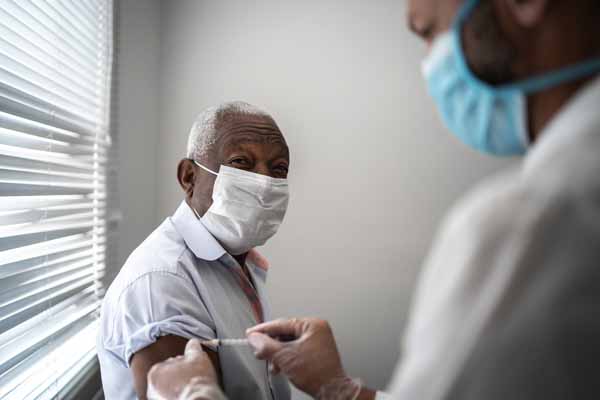
There is plenty of opportunity for discussions around vaccine hesitancy in Texas, where only 55% of people 12 and older are fully vaccinated, according to the Texas Department of State Health Services. This puts Texas below the national average of 60%, according to the Centers for Disease Control and Prevention.
But physicians say a conversation – and an open mind – can help reluctant patients come around to the vaccine. Doctors are also hopeful that the U.S. Food and Drug Administration’s full approval of Pfizer’s COVID-19 vaccine will help disarm some concerns about its rapid development.
Harris County Medical Society President Gary Sheppard, MD, started talking to patients about the vaccine before any were available. Although the Houston internist says most of his patients are vaccinated today, there are a few holdouts.
During visits with such patients, Dr. Sheppard makes sure to take the time to understand what concerns they have about the vaccine. “If I’m not really answering their questions, then that’s not really going to change their minds,” he said.
Some of Dr. Sheppard’s Black patients worried the vaccines were an attempt to experiment on them and that the clinical trials didn’t include Black participants. In such cases, he responded with more information about the trials, which included a higher percentage of Black participants than is typical.
Other patients have encountered vaccine misinformation on social media or from loved ones. “When patients worry about (microchip) trackers, you want to say, ‘Really?’” he said. “But you have to acknowledge their concerns and the fact that this misinformation is circulating.”
Keller pediatrician and Texas Pediatric Society past president Jason Terk, MD, takes a similar approach. Not everyone is receptive to these conversations, but he’s seen enough parents change their minds to keep at it.
“Psychologically it can be a huge beat down in a season of beat downs for health care workers,” he said. “But if I reach a minority of them … then the effort is still valuable and worthwhile and redeeming.”
Texas Medical Association President-Elect and Fort Worth pediatrician Gary Floyd, MD, has found success sharing his own reasons to get vaccinated, including a desire to protect those who are ineligible for the vaccine, such as children under 12.
“I’ve had more parents respond to this line of discussion than to facts about the safety of the vaccine,” he said.
In addition to these tacks, Austin internist James Marroquin, MD, tries to convey the risks of vaccine hesitancy. Given the contagiousness of the delta variant, unvaccinated patients must weigh the risks of getting COVID-19 against the risks of the vaccine.
“Getting the vaccine versus no risk at all doesn’t exist,” he said.
For more vaccine resources, check out TMA’s Vaccines Defend What Matters campaign.
Emma Freer
Associate Editor
(512) 370-1383